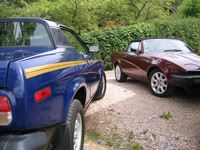<blockquote id="quote"><font size="1" face="Century Gothic, Verdana, Arial, Helvetica" id="quote">quote:<hr height="1" noshade id="quote"><i>Originally posted by Hasbeen</i>
Am I having a gray moment here?
I Presume that the clutch disengages early in the pedal travel, as
well as the clutch biting late.
My thinking is that any air in the system would make the clutch
disengage later, & bite earlier, not later. Any problem with the
thrust race, or fork would have the same effect,
It seems to me that the only thing that can give your trouble is,
1/ The clutch plate is too thin & is only just clamped by the
pressure plate at the last bit of its travel.
2/ The Pressure plate is too far back from the fly wheel, [front of
the cover, which bolts to the fly wheel]
3/ The thrust race is too far forward on the fork, or the fork is
too far forward.
Phil, I hope I am having a gray moment, as if I'm right, only a
little wear will mean the pressure plate will no longer grip the
clutch plate tight enough, & the thing will slip.
Please someone, tell me I'M wrong, & why, otherwise I'm afraid the
thing has to come out to have the correct gear installed.
Hasbeen
<hr height="1" noshade id="quote"></font id="quote"></blockquote id="quote">
Yes with you on your line of thinking here, Hasbeen! If there was air in the system or a faulty seal allowing fluid seepage then surely the clutch would bite almost as soon as you start to let the pedal up, or conversly not disengage until the pedal was right down. Biting near the top of pedal travel suggests a fault such as you describe.
My FHC has it's original clutch, and it bites progressively from about half way pedal travel. Last year I had a master cylinder seal leak which caused the biting point to get closer & closer to the floor, as the system was loosing pressure when you depressed the pedal. I changed the master cylinder seals & it's back to normal. The point being that the fluid leak demonstated the opposite symptoms to yours, Phil.
Tony

<font size="1">1981 2L FHC Cavalry Blue - very original & not rusty!
1980 3.5L V8 DHC Regency Red - on the road again.</font id="size1">




